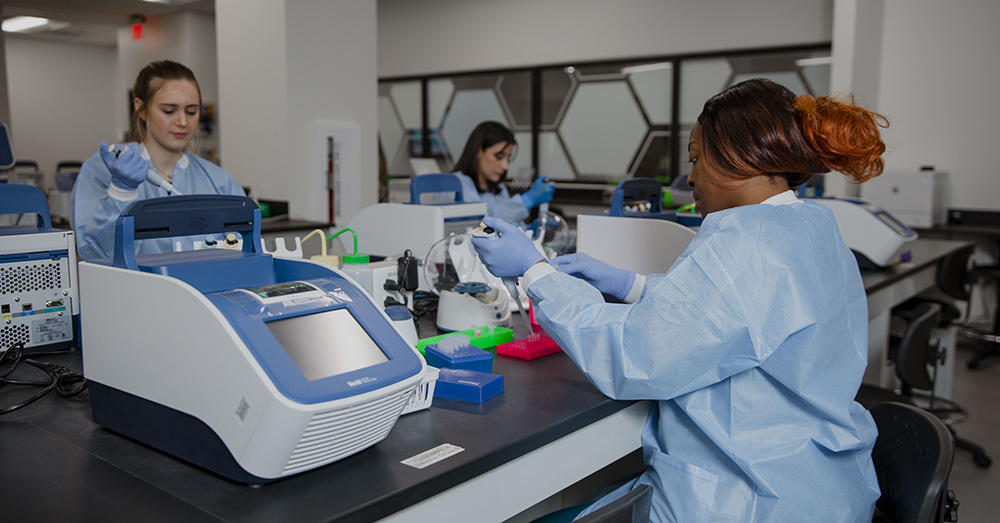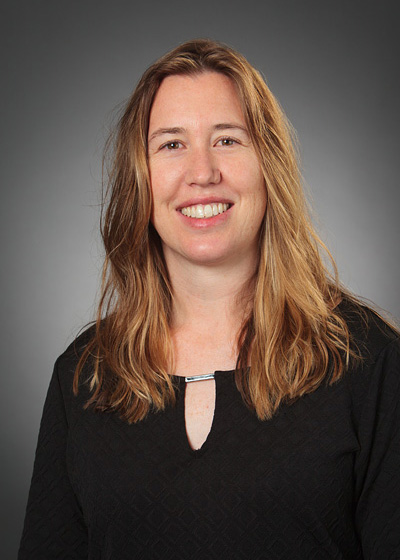Developing Troubleshooting Skills in Molecular Pathology Students
A look at the training and education for becoming a diagnostic molecular scientist.

The Master of Science in Molecular Pathology is a one-year, on-campus degree program
Molecular pathology is playing a key role in the evolution of patient health care. The study and diagnosis of inherited disease, cancer and infectious disease, molecular pathology has become the front line in the fight against COVID-19.
We spoke with Ericka Hendrix, PhD, MB(ASCP)cm, about the training and education involved for diagnostic molecular scientists and how the pandemic has affected the role. Hendrix is an Associate Professor and Director of the Molecular Pathology Program in the TTUHSC School of Health Professions.
What would you say are the most difficult skills molecular pathology students learn and develop in the program?
Hendrix: The last project our students have is to design and validate a molecular assay (or lab test). We assign them a disease; it could be a virus or an inherited disease, and they must design an assay to detect that disease, either by detecting a mutation or by detecting the DNA of the organism. They have to validate their assay so the results are reliable, consistent, accurate and precise with high analytical sensitivity and specificity.
How is troubleshooting learned in the Lab?
Hendrix: When they start on that project, they know how to use the instruments, but we have always told them exactly what to do. In this project, they design their own map for going forward. They have to turn in their plan, how much reagent to use, how much DNA to use, and how to program the instrument they use. If it doesn’t work, they have to change those parameters until it does work. We guide them but don’t tell them what to do. We let them get wrong results until they get it to work. We give them the freedom to fail so they can learn how to recover. They must fix it themselves; we don’t fix it for them. They usually recover very well and learn a lot in the process.

Ericka Hendrix, PhD, MB(ASCP)cm
What is it like to see your students develop these skills?
Hendrix: It’s really exciting because this is a one-year program, and it moves very fast. It is very satisfying to see them so confident at the end. They are kind of mad at us at the beginning of the project, because they don’t think they can do it, but at the end they let their guard down and own it, instead of expecting it to be a certain way. When they understand you don’t have to be told exactly what to do by the teacher, and successfully apply their new skills and knowledge to create something from scratch. This could be commercialized and made into something that is one day FDA approved for clinical laboratory use. It’s exciting to see that potential within them. It’s very empowering for the student and for us to see that hard work pay off. As teachers, you don’t always get to see the lightbulb go off, and I am so lucky, I get to see it every year.
Are there any recent projects that stick out in your mind?
Hendrix: A student named Amanda Cramer graduated in 2019. She developed a test for COVID-19. She was hired by PerkinElmer (a leading, global creator and provider of research and testing) in their research and development department and was instrumental in the design and validation a COVID-19 assay that became emergency authorized by the FDA for use in clinical testing.
And recently, students went to the Mayo clinic for rotations and were tasked to figure out how to use and program a new instrument they had never seen before. They (MAYO) were shocked and amazed at how fast the (TTUHSC) students got the instrument up and running. It’s scary to open Pandora's box, but they weren’t afraid. We have them do that with us so they know where to start in those situations.
How important is hands-on learning?
Hendrix: In school, and in college, you need to learn how to troubleshoot and apply your education to realistic situations. I really think that’s where education needs to move toward and has given our students the greatest success and the ability to be lifelong learners, solving problems that are real-world problems in real-world scenarios. I like simulating a real-world situation, it allows them the chance to put everything they’ve learned together and apply themselves to solve problems they didn’t think they could solve.
About the TTUHSC Master of Science in Molecular Pathology
The Master of Science in Molecular Pathology is a one-year, on-campus degree program where students learn how to perform clinical genetic analysis of human DNA and develop a strong clinical background in our state-of-the-art laboratory facilities. The 12-month sequential program begins in the summer and includes 39 credit hours of classroom, laboratory and research experience and three credit hours of clinical experience. The clinical component is structured to provide skills and practice in diagnostic techniques, quality assurance, and interpreting and reporting patient results.
Related Stories
TTUHSC Receives $1 Million Gift from Amarillo National Bank to Expand and Enhance Pediatric Care in the Panhandle
TTUHSC School of Medicine leaders accepted a $1 million philanthropic gift from Amarillo National Bank on Tuesday (Feb. 10), marking a transformational investment in pediatric care for the Texas Panhandle.
Texas Tech University Health Sciences Center Permian Basin Announces Pediatric Residency Program Gift
TTUHSC Permian Basin, along with the Permian Strategic Partnership and the Scharbauer Foundation, Feb. 5 announced a gift that will fund a new pediatric residency.
The Ph.D. Programs that Shape Health Care
The Graduate School of Biomedical Sciences Ph.D. programs at TTUHSC provide the foundation, mentorship and research opportunities you need to pursue groundbreaking work.
Recent Stories
The John Wayne Cancer Foundation Surgical Oncology Fellowship Program at Texas Tech University Health Sciences Center Announced
TTUHSC is collaborating with the John Wayne Cancer Foundation and has established the Big Cure Endowment, which supports the university’s efforts to reduce cancer incidence and increase survivability of people in rural and underserved areas.
TTUHSC Receives $1 Million Gift from Amarillo National Bank to Expand and Enhance Pediatric Care in the Panhandle
TTUHSC School of Medicine leaders accepted a $1 million philanthropic gift from Amarillo National Bank on Tuesday (Feb. 10), marking a transformational investment in pediatric care for the Texas Panhandle.
Texas Tech University Health Sciences Center Permian Basin Announces Pediatric Residency Program Gift
TTUHSC Permian Basin, along with the Permian Strategic Partnership and the Scharbauer Foundation, Feb. 5 announced a gift that will fund a new pediatric residency.
